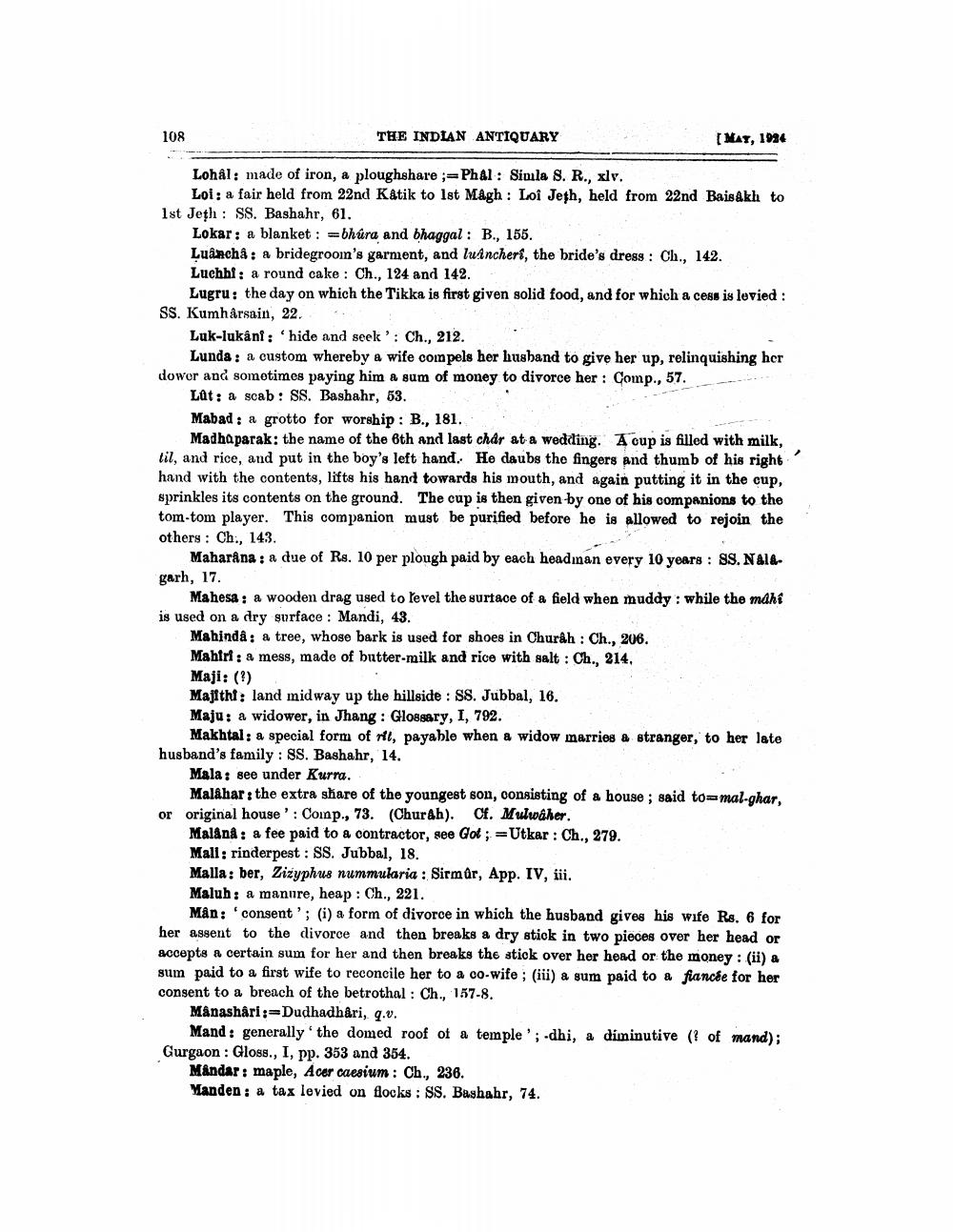________________
THE INDIAN ANTIQUARY
Lohâl: made of iron, a ploughshare ;=Phal: Simla S. R., xlv.
Loi: a fair held from 22nd Kâtik to 1st Magh: Loi Jeth, held from 22nd Baisakh to 1st Jeth SS. Bashahr, 61.
Lokar: a blanket:
108
[MAT, 1924
bhúra and bhaggal: B., 155.
Luânchâ: a bridegroom's garment, and luânchers, the bride's dress: Ch., 142. Luchhi: a round cake: Ch., 124 and 142.
Lugru: the day on which the Tikka is first given solid food, and for which a cess is levied : SS. Kumhârsain, 22.
Luk-lukâni: hide and seek': Ch., 212.
Lunda: a custom whereby a wife compels her husband to give her up, relinquishing her dower and sometimes paying him a sum of money to divorce her: Comp., 57.
Lût: a scab SS. Bashahr, 53.
Mabad: a grotto for worship: B., 181.
Madhaparak: the name of the 6th and last char at a wedding. A cup is filled with milk, til, and rice, and put in the boy's left hand. He daubs the fingers and thumb of his right hand with the contents, lifts his hand towards his mouth, and again putting it in the cup, sprinkles its contents on the ground. The cup is then given by one of his companions to the tom-tom player. This companion must be purified before he is allowed to rejoin the others: Ch., 143.
Maharana: a due of Rs. 10 per plough paid by each headman every 10 years: SS. Nalagarh, 17.
Mahesa: a wooden drag used to level the surtace of a field when muddy: while the mahi is used on a dry surface: Mandi, 43.
Mahindâ a tree, whose bark is used for shoes in Churâh: Ch., 206.
Mahiri: a mess, made of butter-milk and rice with salt: Ch., 214,
Maji: (?)
Majithi: land midway up the hillside: SS. Jubbal, 16.
Maju: a widower, in Jhang: Glossary, I, 792.
Makhtal: a special form of rit, payable when a widow marries a stranger, to her late husband's family: SS. Bashahr, 14.
Mala: see under Kurra.
Malahar: the extra share of the youngest son, consisting of a house; said tommal-ghar, or original house': Comp., 73. (Churah). Cf. Mulwaher.
Malânâ: a fee paid to a contractor, see Got; Utkar: Ch., 279.
Mall: rinderpest: SS. Jubbal, 18.
Malla: ber, Zizyphus nummularia: Sirmûr, App. IV, iii.
Maluh: a manure, heap: Ch., 221.
Mân: 'consent; (i) a form of divorce in which the husband gives his wife Rs. 6 for her assent to the divorce and then breaks a dry stick in two pieces over her head or accepts a certain sum for her and then breaks the stick over her head or the money: (ii) a sum paid to a first wife to reconcile her to a co-wife; (iii) a sum paid to a fiancée for her consent to a breach of the betrothal: Ch., 157-8.
Mânashari: Dudhadhari, q.v.
Mand generally the domed roof of a temple'; -dhi, a diminutive (? of mand); Gurgaon Gloss., I, pp. 353 and 354.
Mandar: maple, Acer caesium: Ch., 236.
Manden: a tax levied on flocks: SS. Bashahr, 74.




